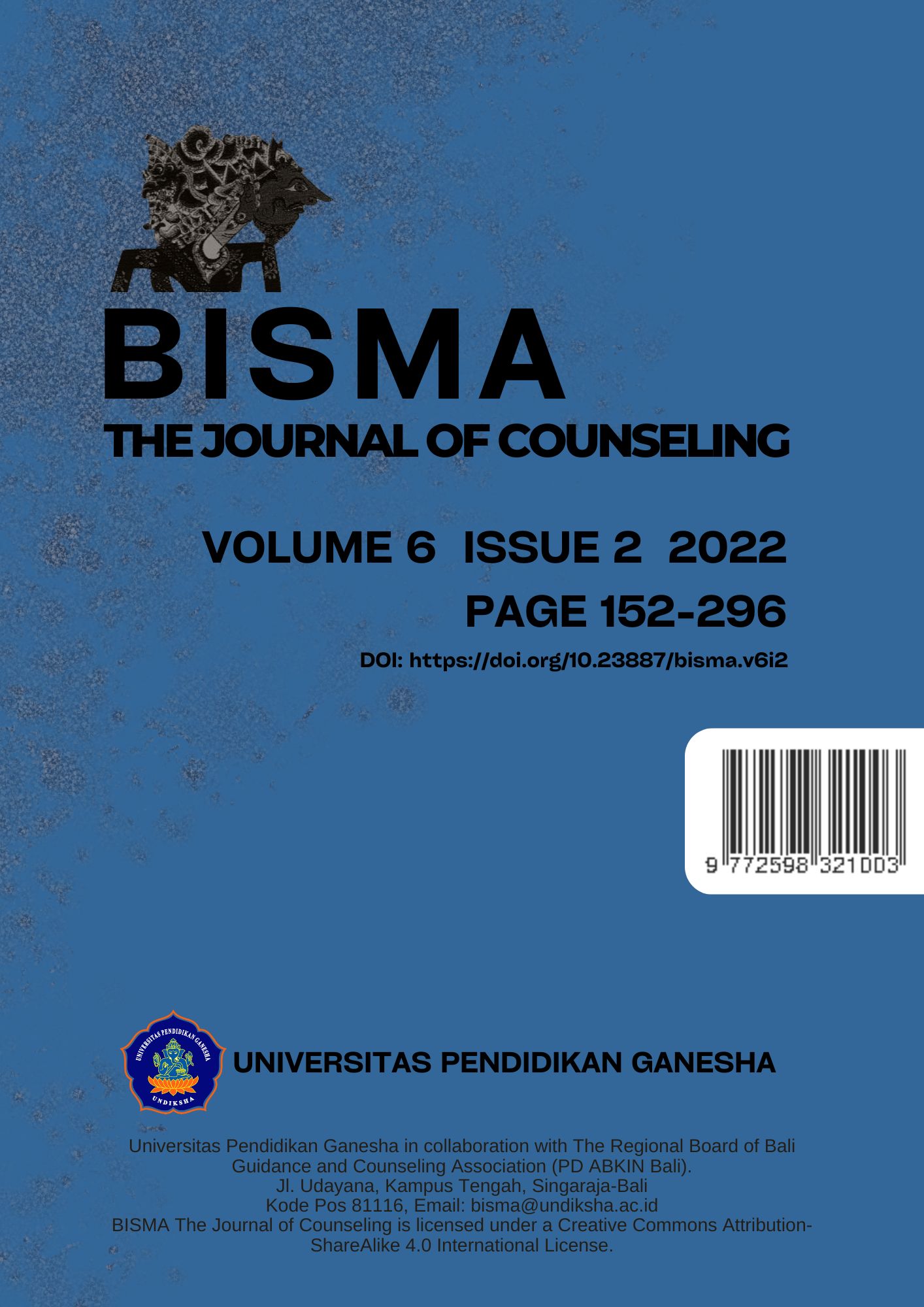The Effect of Emotion Regulation on The Aggressiveness of Adolescent Online Game User During The Covid-19 Pandemic
DOI:
https://doi.org/10.23887/bisma.v6i2.50282Keywords:
emotion regulation, aggressiveness, adolescentsAbstract
This study aims to determine the effect of emotion regulation on the aggressiveness of adolescent online game users during the COVID-19 pandemic. This research uses descriptive quantitative method. The population in this study were all students of SMP N 5 Temanggung and SMP N 1 Kedu totaling 479 respondents, then for the sample taken as many as 128 respondents with non-probability sampling technique. The data analysis technique used multiple linear regression test technique. The results of this study show the effect of emotion regulation on the aggressiveness of online game users during the covid-19 pandemic, this is shown by the results of the partial significance test / t test with the results of 0.005 < 0.05 and the t value of-2.884 which means that "emotional regulation has an effect on negative on aggressiveness and if the emotional regulation of online game users increases, the aggressiveness of online game users will also decrease. So if the emotion regulation of teenagers who use online games is high or can manage their emotions well, it will reduce the level of aggressiveness of teenagers who use online games. Counseling service programs that can be provided to students are related to increasing emotional regulation in adolescents.
References
Bell, R. Q. (2020). Socialization findings reexamined. In Child effects on adults (pp. 53-84). Routledge.
Eden, S., & Eshet-Alkalai, Y. (2014). The effect of digital games and game strategies on young adolescents’ aggression. Journal of Educational Computing Research, 50(4), 449–466. https://doi.org/10.2190/EC.50.4.a
Firdaus, M. T., Muhari, P. D. H., Pratiwi, D. T. I. M. P., & Christina, E. S. P. M. P. (2013). SMP Kelurahan Kedung Asem Surabaya The Causal Factors On Aggesive Behavior Of The Students In Kedung Asem Junior High School Surabaya. Jurnal COUNSELING UNESA, 1, 68–76.
Gabbiadini, A., Riva, P., Andrighetto, L., Volpato, C., & Bushman, B. J. (2022). Preliminary evidence of the effectiveness of a brief self‐control intervention on reducing the short‐term harmful consequences of violent video games on adolescents. Journal of Applied Social Psychology, 52(4), 246-258.
Gross, J. J. (2007). Emotion Regulation:Conceptual Foudantions. Handbook of Emotion Regulation, 3–24. http://citeseerx.ist.psu.edu/viewdoc/download?doi=10.1.1.688.8579&rep=rep1&type=pdf
Harta Dvikaryani, N. K. S., & Jannah Miftakhul. (2020). Hubungaan Antara Regulasi Emosi Dengan Agresiitas Atlet Tinju Batlyon Artileri Pertahanan Udara Sedang 8. Character: Jurnal Penelitian Psikologi, 7, 1–7.
Leander, N. P., Agostini, M., Stroebe, W., Kreienkamp, J., Spears, R., Kuppens, T., ... & Kruglanski, A. W. (2020). Frustration-affirmation? Thwarted goals motivate compliance with social norms for violence and nonviolence. Journal of personality and social psychology, 119(2), 249.
López-Bueno, R., Koyanagi, A., López-Sánchez, G. F., Firth, J., & Smith, L. (2021). Association between age of first exposure and heavy internet use in a representative sample of 317,443 adolescents from 52 countries. European child & adolescent psychiatry, 1-9.
Lovelace, D. L., McDaniel, L. R., & Golden, D. (2019). Long‐term effects of breast cancer surgery, treatment, and survivor care. Journal of midwifery & women's health, 64(6), 713-724.
Makkl, S. (2020, April 1). Pengguna game online meningkat 75% kala corona. CNNIndonesia. https://www.cnnindonesia.com/teknologi/20200331163816-185-488789/pengguna-gim-online-meningkat-75-persen-kala-corona
Mugianti, D. S., Nandiyanto, A. B. D., Kurniawan, T., & Bilad, M. R. (2022). Analysis of Elementary School Students’ Leisure Time during the Covid-19 Pandemic. Indonesian Journal of Multidiciplinary Research, 2(2), 223-228.
Nadeak, B. (2021). The Impact of Online Game Addiction on the Quality of Student Education During the COVID-19 Pandemic. Jurnal Pendidikan dan Pengajaran, 54(3).
Permana, I. M. D., & Tobing, D. H. (2019). Peran intensitas bermain game online dan pola asuh permisif orangtua terhadap tingkat agresivitas pada remaja awal di Kota Denpasar. Jurnal Psikologi Udayana, 6(01), 139–151. https://doi.org/10.24843/jpu.2019.v06.i01.p14
Roberton, T., Daffern, M., & Bucks, R. S. (2012). Emotion regulation and aggression. Aggression and Violent Behavior, 17(1), 72–82. https://doi.org/10.1016/j.avb.2011.09.006
Rosyati, T., Purwanto, M. R., Gumelar, G., Yulianti, R. T., & Mukharrom, T. (2020). Effects of games and how parents overcome addiction to children. Journal of Critical Reviews, 7(1), 65-67.
Saha, A., Dutta, A., & Sifat, R. I. (2021). The mental impact of digital divide due to COVID-19 pandemic induced emergency online learning at undergraduate level: Evidence from undergraduate students from Dhaka City. Journal of Affective Disorders, 294, 170-179.
Saputri, I. K. E., & Sugiariyanti. (2016). Hubungan Sibling Rivalry Dengan Regulasi Emosi Pada Masa Kanak Akhir. Intuisi : Jurnal Psikologi Ilmiah, 8(2), 133–139.
Saputri, O. K., Widiastuti, R., & Pratama, M. J. (2019). Analisis Bentuk-bentuk Perilaku Agresif Siswa Pengguna Game Online. Bimbingan Konseling, 1.
Sugiyono. (2016). Metode Penelitian Pendidikan Pendekatan Kuantitatif, Kualitatif, dan R&D. ALFABETA.
Videler, A. C., Hutsebaut, J., Schulkens, J. E., Sobczak, S., & Van Alphen, S. P. (2019). A life span perspective on borderline personality disorder. Current psychiatry reports, 21(7), 1-8.
Wibowo, N. E., & Nashori, H. F. (2017). Self Regulation and Aggressive Behavior on Male Adolescence. Psikologi, 8(1), 1–6.
Yuliastutie, R. (2017). Pengaruh Tingkat Pola Asuh Permisif Terhadap Tingkat Agresivitas Pada Siswa Tk Aba 36 Ppi. PSIKOSAINS (Jurnal Penelitian Dan Pemikiran Psikologi), 12(1), 33–44.
Downloads
Published
Issue
Section
License
Copyright (c) 2022 Itsna Putri Nur Hanifa

This work is licensed under a Creative Commons Attribution-ShareAlike 4.0 International License.








